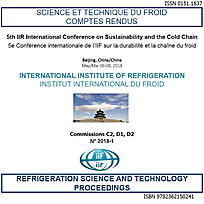
Document IIF
Enseignements tirés des accords énergétiques concernant les supermarchés pour une société durable.
Energy agreements regarding grocery stores for a sustainable society - Lessons learned.
Numéro : pap. 21
Auteurs : LINDBERG U., ROLFSMAN L., SWARTZ H.
Résumé
In this study we aim to shed light on waste heat from commercial refrigeration, which is common but unnecessary. Excess heat is the heat which is not recovered, although it is possible to do so. We include heating for existing buildings:grocery stores as stand-alone, or within another building. VariousSwedish perspectives of the parties involved, tenant and landlord, are discussed. Theoretically and technically, it is not difficult to distributeexcess energy from a tenant to another receiver, which in turn uses the energy. However, to meet energy goals regarding energy consumption for heating buildings requires new and efficient approaches. The technique is already known and availableon the market. We suggest that availableenergy and heat recovery projects, contracts and agreements maysignificantly enhance the possibility of creating viable energy efficiency projects, and include excess heat. Results include lessons learned from the parties.
Documents disponibles
Format PDF
Pages : 8
Disponible
Prix public
20 €
Prix membre*
Gratuit
* meilleur tarif applicable selon le type d'adhésion (voir le détail des avantages des adhésions individuelles et collectives)
Détails
- Titre original : Energy agreements regarding grocery stores for a sustainable society - Lessons learned.
- Identifiant de la fiche : 30023363
- Langues : Anglais
- Source : 5th IIR International Conference on Sustainability and the Cold Chain. Proceedings: Beijing, Chine, 6-8 avril 2018
- Date d'édition : 06/04/2018
- DOI : http://dx.doi.org/10.18462/iir.iccc.2018.0021
Liens
Voir d'autres communications du même compte rendu (72)
Voir le compte rendu de la conférence
Indexation
-
Energy distribution concepts for Urban Supermar...
- Auteurs : SELVNES H., HAFNER A.
- Date : 18/06/2018
- Langues : Anglais
- Source : 13th IIR Gustav Lorentzen Conference on Natural Refrigerants (GL2018). Proceedings. Valencia, Spain, June 18-20th 2018.
- Formats : PDF
Voir la fiche
-
Optimising a supermarket refrigeration system w...
- Auteurs : STEUER D., JOSEFSSON F., ARIAS J., SAWALHA S.
- Date : 21/08/2023
- Langues : Anglais
- Source : Proceedings of the 26th IIR International Congress of Refrigeration: Paris , France, August 21-25, 2023.
- Formats : PDF
Voir la fiche
-
Optimizing surplus heat utilization: A case stu...
- Auteurs : THANASOULAS S., KRIEZI E. E., SEVER M., JESSEN L. M.
- Date : 08/2024
- Langues : Anglais
- Source : 16th IIR-Gustav Lorentzen Conference on Natural Refrigerants (GL2024). Proceedings. University of Maryland, College Park, Maryland, USA, August 11-14 2024
- Formats : PDF
Voir la fiche
-
Techno-economic analysis of heat export from su...
- Auteurs : STEUER D., ALMEBÄCK J., MAGNIUS R., SAWALHA S.
- Date : 21/08/2023
- Langues : Anglais
- Source : Proceedings of the 26th IIR International Congress of Refrigeration: Paris , France, August 21-25, 2023.
- Formats : PDF
Voir la fiche
-
Cooperation for heat recovery from a supermarke...
- Auteurs : STEUER D., ANDERSSON E., JOSEFSSON F., SAWALHA S., ARIAS J.
- Date : 13/06/2022
- Langues : Anglais
- Source : 15th IIR-Gustav Lorentzen Conference on Natural Refrigerants (GL2022). Proceedings. Trondheim, Norway, June 13-15th 2022.
- Formats : PDF
Voir la fiche
